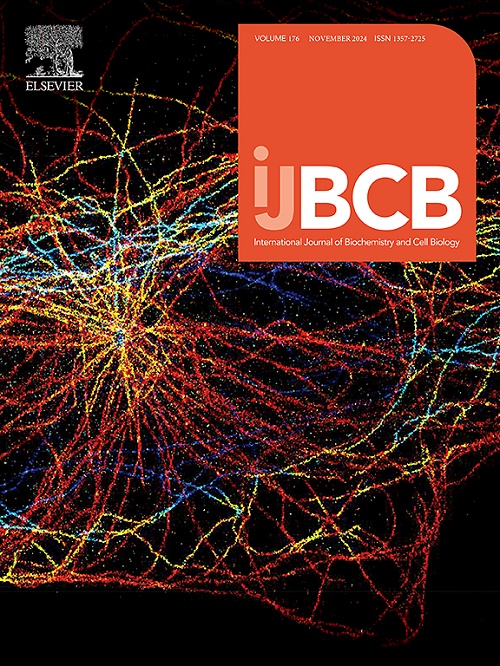MLN4924 Suppresses head and neck squamous cell carcinoma progression by inactivating the mTOR signaling pathway via the NEDD8/CUL4/TSC2 axis
IF 2.8
3区 生物学
Q2 BIOCHEMISTRY & MOLECULAR BIOLOGY
International Journal of Biochemistry & Cell Biology
Pub Date : 2024-11-18
DOI:10.1016/j.biocel.2024.106696
引用次数: 0
Abstract
Head and neck squamous cell carcinoma (HNSCC) is an aggressive cancer with a five-year survival rate below 50 %. Standard treatments for HNSCC include surgery, radiotherapy, chemotherapy, and targeted therapies, but they still have significant limitations. Neddylation, a post-translational modification involving the attachment of NEDD8 (neural precursor cells expressed developmentally down-regulated 8) to proteins, is frequently dysregulated in HNSCC, thereby promoting tumor growth. MLN4924, also known as Pevonedistat, is a Neddylation inhibitor that has shown promise in suppressing HNSCC cell proliferation and invasion, establishing it as a potential therapeutic option. However, its precise molecular mechanism remains unclear. This study aims to investigate the mechanism of MLN4924 in HNSCC. This study examined the effects of MLN4924 on HNSCC and its associated molecular pathways. Bioinformatic analysis indicated that NEDD8, a critical component of the Neddylation pathway, is linked to poor prognosis and the mTOR (mammalian target of rapamycin) signaling pathway in HNSCC. MLN4924 significantly suppressed cell migration, invasion, and the epithelial-mesenchymal transition (EMT) pathway, and downregulated NEDD8 expression. Mechanistic studies demonstrated that MLN4924 inhibited the binding of NEDD8 to cullin4 (CUL4) and prevented the Neddylation of tuberous sclerosis complex 2 (TSC2), leading to the inactivation of the mTOR pathway. These findings were confirmed in vivo, where MLN4924 effectively inhibited tumor growth. Overall, MLN4924 disrupted Neddylation pathway and stabilized TSC2, thereby inactivating the mTOR pathway. The study provided a theoretical basis for the clinical potential of MLN4924 in improving treatment outcomes for HNSCC patients, offering a novel strategy for addressing this challenging disease.
MLN4924通过NEDD8/CUL4/TSC2轴抑制mTOR信号通路,阻止头颈部鳞状细胞癌进展
头颈部鳞状细胞癌(HNSCC)是一种侵袭性癌症,五年生存率低于 50%。HNSCC 的标准疗法包括手术、放疗、化疗和靶向疗法,但这些疗法仍有很大的局限性。Neddylation是一种翻译后修饰,涉及NEDD8(神经前体细胞表达的发育下调8)与蛋白质的连接,在HNSCC中经常出现失调,从而促进肿瘤生长。MLN4924又名Pevonedistat,是一种Neddylation抑制剂,有望抑制HNSCC细胞的增殖和侵袭,成为一种潜在的治疗选择。然而,其确切的分子机制仍不清楚。本研究旨在探讨 MLN4924 在 HNSCC 中的作用机制。本研究探讨了MLN4924对HNSCC的影响及其相关分子通路。生物信息学分析表明,NEDD8是Neddylation通路的重要组成部分,与HNSCC的不良预后和mTOR(哺乳动物雷帕霉素靶标)信号通路有关。MLN4924能显著抑制细胞迁移、侵袭和上皮-间质转化(EMT)通路,并下调NEDD8的表达。机理研究表明,MLN4924抑制了NEDD8与cullin4(CUL4)的结合,阻止了结节性硬化症复合物2(TSC2)的Neddylation,从而导致mTOR通路失活。这些发现在体内得到了证实,MLN4924 能有效抑制肿瘤生长。总之,MLN4924破坏了Neddylation通路,稳定了TSC2,从而使mTOR通路失活。这项研究为 MLN4924 改善 HNSCC 患者治疗效果的临床潜力提供了理论依据,为治疗这种具有挑战性的疾病提供了一种新策略。
本文章由计算机程序翻译,如有差异,请以英文原文为准。
求助全文
约1分钟内获得全文
求助全文
来源期刊
CiteScore
8.10
自引率
0.00%
发文量
124
审稿时长
19 days
期刊介绍:
IJBCB publishes original research articles, invited reviews and in-focus articles in all areas of cell and molecular biology and biomedical research.
Topics of interest include, but are not limited to:
-Mechanistic studies of cells, cell organelles, sub-cellular molecular pathways and metabolism
-Novel insights into disease pathogenesis
-Nanotechnology with implication to biological and medical processes
-Genomics and bioinformatics

 求助内容:
求助内容: 应助结果提醒方式:
应助结果提醒方式:


